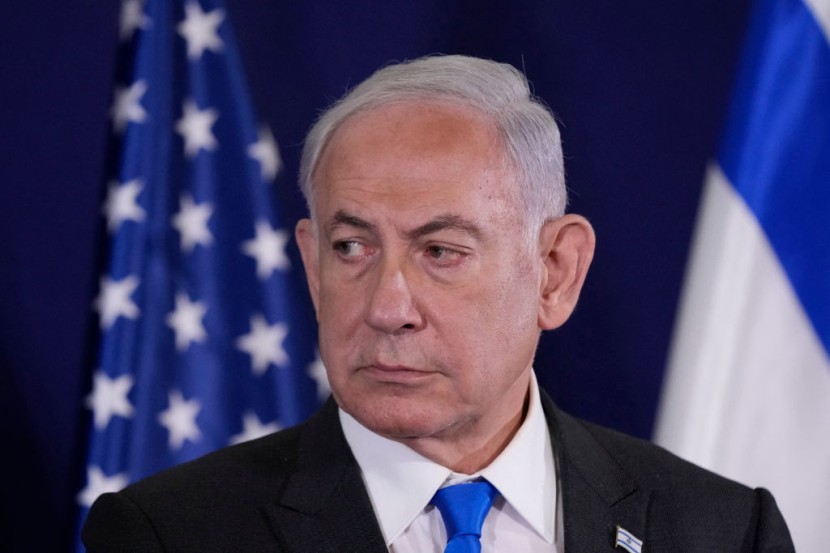Israeli Prime Minister Benjamin Netanyahu dismissed the idea of Palestinian sovereignty after discussions with US President Joe Biden regarding the future of Gaza. Netanyahu emphasized that Israel's security requirements would not align with the establishment of a Palestinian state.
The Israeli leader did not provide any other details in his one-line post in Hebrew. The territory west of Jordan encompasses Israel, the occupied West Bank, and Hamas-run Gaza, where Israel is battling the militant group following the October 7 attacks.

Biden and his top officials - including Secretary of State Antony Blinken, who visited Israel and the region last week - have said the creation of a Palestinian state with guarantees for Israel's security is the only way to finally bring peace and stability to the Middle East.
"I will not compromise on full Israeli security control over all the territory west of Jordan - and this is contrary to a Palestinian state," Netanyahu said in a post on X.
United Nations Secretary General Antonio Guterres on Sunday called opposition to a two-state solution "unacceptable."
Amid reports the US, Egypt and Qatar want Israel to join a new phase of talks with Hamas, Netanyahu this weekend also publicly rejected what he characterized as Hamas' terms for releasing more Israeli hostages from Gaza: an end of the war, the withdrawal of Israeli forces from the Palestinian enclave, and the release of more Palestinians from Israeli prisons.
"If we agree to this - our soldiers fell in vain. If we agree to this - we will not be able to guarantee the security of our citizens," Netanyahu said Sunday. Netanyahu's comments comes amid a rift with the US, Israel's most important ally, on what Gaza will look like once the conflict ends, and exposes the complex position Netanyahu is in.
The Israeli prime minister is facing competing pressure from the international community to allow the creation of a viable Palestinian state and domestically to guarantee Israel's security, most notably from far-right members of his coalition.
Adding to the pressure, he is also facing calls for early elections, with thousands taking to the streets of Tel Aviv on Saturday. Critics have accused Netanyahu of prolonging the war to stay in power. War cabinet minister Gadi Eisenkot says he hopes that is not the case, but also says elections should happen within months.
Netanyahu had told Biden in a private phone call on Friday that he was not foreclosing the possibility of a Palestinian state in any form, a personal familiar with the conversation told CNN.
Netanyahu emphasizes the importance of Israel's ongoing fight for "complete victory" and the elimination of the threat posed by Hamas. However, he has not provided specific details on the strategies to achieve these goals. Gaza has been under the governance of Hamas since 2007, following the implementation of a land, sea, and air blockade by Israel on the region, which is home to 2.3 million people.
Netanyahu Allegedly Delays End to Israel-Hamas War
However, a prominent figure in Israel's war cabinet, former army chief Gadi Eisenkot, has expressed the view that a ceasefire is the most effective means of ensuring the release of the captives. This statement can be seen as a critique of Israel's current strategy.
Netanyahu has faced criticism for allegedly hindering a discussion at the cabinet level regarding the future of Gaza after the war. There are claims that he is deliberately delaying to avoid any potential conflicts within his coalition. The claim that Netanyahu was unnecessarily prolonging the war was dismissed as "utter nonsense" by his office.
Israel initiated its military campaign in Gaza following a series of devastating attacks on October 7, resulting in the loss of approximately 1,100 lives, predominantly innocent civilians. Additionally, around 250 individuals were captured during these incidents.
Amidst the mounting challenges faced by Netanyahu's government, a significant number of Israelis took to the streets of Tel Aviv on Saturday, demanding fresh elections. Meanwhile, outside the prime minister's residence, demonstrators gathered in solidarity with the families of over 100 individuals still held captive by Hamas and other militant groups. Concerns have been raised about the potential risks to the lives of captives due to Israel's military activity, Aljazeera reported.








